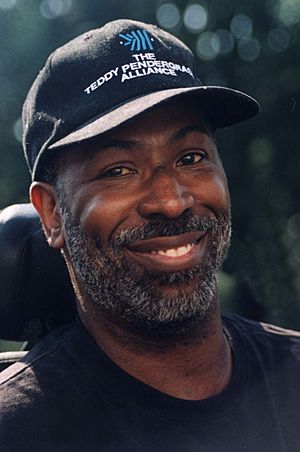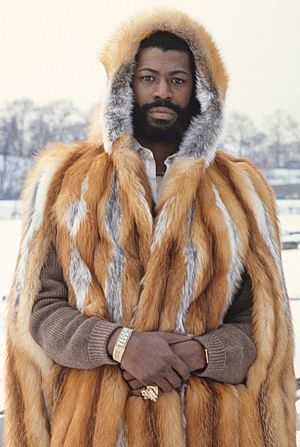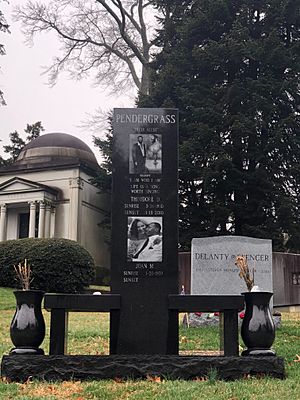Teddy Pendergrass facts for kids
Quick facts for kids
Teddy Pendergrass
|
|
|---|---|

Pendergrass in 2001
|
|
| Background information | |
| Birth name | Theodore DeReese Pendergrass |
| Born | March 26, 1950 Kingstree, South Carolina, U.S. |
| Died | January 13, 2010 (aged 59) Bryn Mawr, Pennsylvania, U.S. |
| Genres | |
| Occupation(s) |
|
| Years active | 1970–2008 |
| Labels |
|
| Associated acts |
|
Theodore DeReese Pendergrass (March 26, 1950 – January 13, 2010) was an American singer and songwriter. He was famous for his R&B and soul music. Teddy was born in Kingstree, South Carolina, but spent most of his life near Philadelphia.
He first became well-known as the lead singer of the group Harold Melvin & the Blue Notes. After leaving the group in 1976, Teddy started a very successful solo career. He released many popular albums. Sadly, his career was put on hold after a car crash in March 1982. This accident left him unable to move his legs. Even after the crash, Teddy continued his successful music career until he retired in 2007. He passed away in January 2010.
Contents
Early life
Teddy Pendergrass was born on March 26, 1950, in Kingstree, South Carolina. He was the only child of Jesse and Ida Geraldine Pendergrass. When Teddy was very young, his father left the family. His mother later helped him meet his father when he was 11 years old.
Teddy grew up in a less wealthy part of North Philadelphia. He often sang in church. He even dreamed of becoming a pastor. When he was 10, he became an ordained minister. Teddy also learned to play the drums and was a junior deacon at his church.
He went to Thomas Edison High School for Boys in North Philadelphia. He sang with the Edison Mastersingers. He left school in the 11th grade to start his music career. He recorded his first song, "Angel with Muddy Feet," but it was not a big hit.
Teddy played drums for several local bands in Philadelphia. In 1970, Harold Melvin, the founder of the Blue Notes, saw him. Melvin asked Teddy to play drums for his group. During one performance, Teddy started singing along. Melvin was so impressed by his voice that he made Teddy the lead singer. Before Teddy joined, the Blue Notes were not very successful. This changed when they signed a deal with Philadelphia International Records in 1971. This began Teddy's successful work with the label's founders, Kenny Gamble and Leon Huff.
Solo career
Early success
In 1977, Teddy released his first solo album, Teddy Pendergrass. It became very popular, especially with the disco song "I Don't Love You Anymore". His next song, "The Whole Town's Laughing at Me," was also a hit.
In 1978, he released Life Is a Song Worth Singing. This album was even more successful. It included the popular songs "Only You" and the classic "Close the Door". The album also featured the dance hit "Get Up, Get Down, Get Funky, Get Loose".
In 1979, Teddy released two more successful albums: Teddy and a live album called Live Coast to Coast. The Teddy album stayed at number one on the R&B charts for eight weeks. Songs like "Come Go with Me" and "Turn Off the Lights" were big hits from this album.
His 1980 album, TP, included the classic song "Love TKO". It also had a duet with Stephanie Mills called "Feel the Fire". Between 1977 and 1981, Teddy Pendergrass had five albums in a row that sold millions of copies. This was a record for an R&B artist at that time.
Teddy's popularity grew hugely by the end of 1978. His concerts were always sold out, especially with many women in the audience. His manager, Shep Gordon, came up with the idea of "women-only concerts." This was a new trend that still happens today. With many successful albums, Teddy was becoming a huge star. Some people even called him "the black Elvis." By early 1982, Teddy Pendergrass was one of the top male R&B artists.
Car accident
On March 18, 1982, Teddy Pendergrass was in a car crash. It happened in Philadelphia while he was driving his new Rolls-Royce. A friend was also in the car with him. It seemed like the car's brakes might have failed. The car hit a guard rail and two trees. Teddy and his friend were stuck in the car for 45 minutes. His friend had minor injuries. However, Teddy had a serious spinal cord injury. This left him unable to move his body from the chest down. He never walked again.
Later solo career
Many fans sent Teddy Pendergrass good wishes during his recovery. In August 1982, an album called This One's for You was released. It included songs Teddy had recorded before the crash.
After his recovery, Teddy signed a new music contract. In 1984, he released the album Love Language. This album featured the song "Hold Me" with a singer who was not yet famous, Whitney Houston.
On July 13, 1985, Teddy made an emotional return to the stage. He performed at the famous Live Aid concert in Philadelphia. Over 100,000 people were there, and about 1.5 billion watched on TV. It was his first live show since the accident. Teddy thanked the audience and sang the song "Reach Out and Touch (Somebody's Hand)".
In 1988, Teddy had another number-one R&B hit with the song "Joy." The music video for "Joy" was played often on BET. This album also sold very well. Teddy continued to record music throughout the 1990s. One of his last hits was "Believe in Love" in 1994. In 1996, he performed in a gospel musical called Your Arms Too Short to Box with God with Stephanie Mills. In 1998, Teddy released his autobiography, Truly Blessed.
On February 14, 2002, Teddy Pendergrass performed a concert in Los Angeles called "The Power of Love." This concert was later released as the album From Teddy, With Love. Videos of this concert, especially his performance of "Joy", can still be seen online.
In his later years, Teddy's song "Wake Up Everybody" was covered by many artists. It was also used to encourage people to vote in the 2004 Presidential campaign. Many other artists have used parts of his songs in their own music.
In 2006, Teddy announced he was retiring from music. In 2007, he performed briefly for a special event called Teddy 25. This event celebrated his life and raised money for his charity, The Teddy Pendergrass Alliance.
Personal life and death
Teddy Pendergrass had three children: Tisha, LaDonna, and Theodore Jr.
In 1987, he married Karen Still, a former dancer. They later divorced in 2002.
In 1998, Teddy published his life story in a book called Truly Blessed.
In 2006, Teddy met Joan Williams. They got married in a private ceremony on March 23, 2008. A bigger wedding celebration took place in Rhode Island in September 2008. Joan Pendergrass created a youth fund in Teddy's name to help young people in Philadelphia.
Teddy Pendergrass passed away on January 13, 2010, at the age of 59. He died from breathing problems in Bryn Mawr, Pennsylvania, with his wife by his side. He was buried at the West Laurel Hill Cemetery in Bala Cynwyd, Pennsylvania.
There are plans to make a movie about Teddy Pendergrass's life. The actor Tyrese Gibson is expected to play him. In 2019, a documentary about Teddy's life called If You Don't Know Me was released.
Discography
- Teddy Pendergrass (1977)
- Life Is a Song Worth Singing (1978)
- Teddy (1979)
- TP (1980)
- It's Time for Love (1981)
- This One's for You (1982)
- Heaven Only Knows (1983)
- Love Language (1984)
- Workin' It Back (1985)
- Joy (1988)
- Truly Blessed (1991)
- A Little More Magic (1993)
- You and I (1997)
- This Christmas (I'd Rather Have Love) (1998)
Awards and honors
Grammy Award nominations
Teddy Pendergrass was nominated for five Grammy Awards.
| Award | Year | Result | Category | Song |
|---|---|---|---|---|
| Grammy Award | 1979 | Nomination | Best Male R&B Vocal Performance | "Close the Door" |
| 1982 | Nomination | Best Male R&B Vocal Performance | "I Can't Live Without Your Love" | |
| 1989 | Nomination | Best Male R&B Vocal Performance | Joy | |
| 1992 | Nomination | Best Male R&B Vocal Performance | "How Can You Mend a Broken Heart" | |
| 1994 | Nomination | Best Male R&B Vocal Performance | "Voodoo" |
Other awards
Teddy Pendergrass was nominated for several American Music Awards between 1979 and 1981. He won the AMA for Favorite Soul/R&B Male Artist in 1979, sharing the award with singer Lou Rawls. After his death, Teddy Pendergrass was added to the National Rhythm & Blues Hall of Fame in 2021.
See also
 In Spanish: Teddy Pendergrass para niños
In Spanish: Teddy Pendergrass para niños
 | John T. Biggers |
 | Thomas Blackshear |
 | Mark Bradford |
 | Beverly Buchanan |



